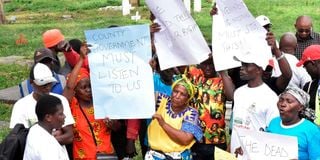Premium
No respite for the landless as disputes plague Coast region

Locals demonstrate early last month after a toilet block was built on the graves of their loved ones at the Kongowea cemetery. They urged the Mombasa County Government to erect a perimeter wall around the site to secure the public land from grabbers.
Like a bad dream that just won’t go away, the land issue in Coast region recurs after every election season when the political noise that gives false hope to locals dies down and the landless are, once again, left to their own devices.
With politicians retreating to enjoy the spoils of war after winning elections and having incited locals to invade private land on the pretext that it’s ancestral property, the owners always come out to reclaim their plots.
In Mombasa, the Methodist Church of Kenya has come out to take back its 210 acres in Ganahola, Jomvu Constituency, where over 1,000 families have refused to vacate the property, claiming it’s their ancestral land.
The church says squatters started invading its property more than three decades ago. Bishop Joshua M’Ikiao, who heads the church in Mombasa and Kwale counties, said that by the year 2000, the property had been almost fully occupied by invaders.
He said: “This is church land; it was brought in 1888 for around 3,500 British pounds by missionaries. But people began to invade the land leaving a few parcels, especially in the hilly areas.”
‘Sell it to the state’
The cleric told Nation the church had challenges securing its property due to its size.
“We want a solution. If we can agree with the government, a valuer can come to estimate a price so that we can sell it to the state to formally settle the squatters. During campaigns, politicians were inciting locals to stay put,” he said. “They were using the land as a political tool.”
But some occupants—like Mr Samuel Kirambo—said they bought the land for between Sh100,000 and Sh300,000 for a 50 feet by 100 feet plot, for which no title deeds “or any ownership documents” were issued .
“But I’m now living in fear after the church came out to claim it. Who’ll refund me my money? The government should addressing this thorny issue,” he asked.
In the Hidabo area of Lamu Island, temporary structures and makeshift tents dot the land. One might confuse the scene with a camp for internally displaced persons, but they are squatters who have encroached on government land.
The area hosts the county commissioner’s official residence and the governor’s house will be built there. Public Works Department offices and other county and national government premises are also here.
Lamu County Commissioner Irungu Macharia has now put land-grabbers and encroachers on notice following renewed invasions of government land in the region.
“Some people are very daring. You can imagine an individual encroaching on my residential plot, the government’s land,” Mr Macharia said.
Governor Timamy urged authorities to arrest and prosecute grabbers of government land.
A buying frenzy
The statements come as Lamu County faces many cases of land-grabbing, particularly by moneyed individuals who are taking advantage of the multibillion-shilling Lamu Port South Sudan Ethiopia Transport (Lapsset) Corridor project to claim compensation.
Lamu Port was commissioned by former President Uhuru Kenyatta in May last year, triggering a buying frenzy among land speculators. Most land in Lamu has not been demarcated and title deeds issued, making it a target for grabbers. Almost 60 per cent of the land in the region is listed as public.
In Kilifi, Governor Gideon Mung’aro has pledged to negotiate with the national government to ensure residents get title deeds. He said he wants to speed up adjudication of land to ensure people have title deeds. The governor is counting on the Environment and Land Court to settle disputes.
The judges will pitch camp at Pwani University in December for a week, hearing and ruling on various land disputes.
Saying he will work with the Judiciary to speed up “issues of land disputes and the cases pending in court”, Mr Mung’aro added: Please turn out in large numbers at [Pwani] university.”
Recently, Mombasa Senator Mohamed Faki and Kisauni MP Rashid Bedzimba protested at the rising cases of evictions arising from land squabbles.
Mr Faki said that land wrangles are rife especially in Kisauni where landowners and squatters have been fighting over ownership.
Lasting solution
“Land has been a thorny issue in Mombasa for long. The conflicts between landowners and squatters are serious and the leadership of the county needs to come up with solutions acceptable to both parties,” said Mr Faki during a meeting with Kisauni residents.
Mr Bedzimba said there are major land conflicts in his constituency.
“I was called by groups representing residents of the Washanga area in Mtopanga Ward on the land disputes. We must find a lasting solution to the issue,” he said, adding, the government must ensure all landless people are allocated land and issued with official title deeds.
In Kiembeni in Mombasa County, hundreds of squatters living on a 100-acre parcel, belonging to a real estate company, could be rendered homeless after Justice Nelly Matheka, presiding over an Environment and Land Court sitting, ordered them to vacate the plot within 180 days, or face forceful eviction.
The judge further declared ZumZum Investments Ltd as the lawfully registered owner of the land.
The over 800 families had claimed that they acquired the land by way of adverse possession after occupying it for over 12 years.






